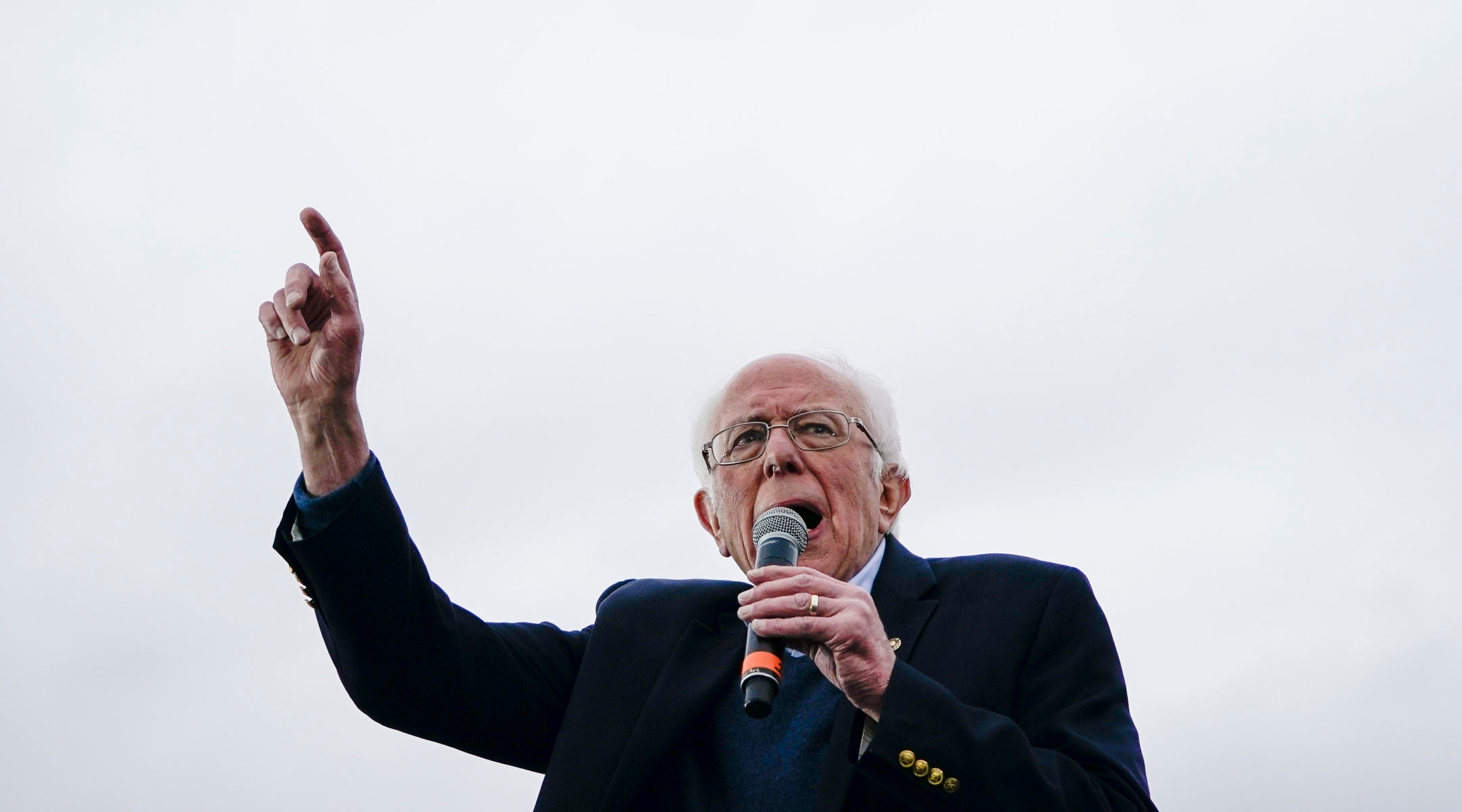NEW YORK (JTA) — On Sunday night, Sen. Bernie Sanders announced via tweet that he would not be attending the upcoming AIPAC policy conference in Washington, D.C., accusing the pro-Israel lobby of being a platform for “bigotry.” His statement came one week after his campaign released a video about how Sanders is “proud to be Jewish” and a month after a four-minute video with similar themes.
Given that Sanders refuses to address the diverse, bipartisan group of 18,000 pro-Israel, mostly Jewish constituents, one is compelled to ask: What kind of Jewish pride does Sanders have?
Only four years ago, Sanders thanked his supporters for a landslide victory in New Hampshire — and notably left out his Jewishness. Instead, he described himself as “the son of a Polish immigrant who came to this country speaking no English and having no money.” As one rabbi noted at the time, no Pole would have considered him their own.
Two days later, in a debate with Hillary Clinton, Sanders referred to his historic candidacy of “somebody with my background” without overtly stating he was Jewish.
At the time, the media, his detractors and even his supporters pondered on why he avoided his Judaism. A better question today, as the candidate is making his Jewish identity more central to this year’s campaign, is why a proud Jew refuses to engage with one of Jewish America’s most influential organizations.
One answer can be found in Sanders’ most recent campaign video itself.
Set to solemn music, the two-minute clip focuses on the rise in violent anti-Semitism and white nationalism, the Trump administration’s toxic rhetoric and the Sanders family’s persecution during the Holocaust.
The clip is a manifestation of underdog Judaism, one rooted in powerlessness and victimhood — a Judaism of suffering, persecution and discrimination.
In 110 seconds, viewers are shown clips of neo-Nazis chanting threats in Charlottesville, heaps of Jewish corpses in a concentration camp, the wrought-iron gates of Auschwitz and an ambulance at the scene of the infamous Monsey attack, when a man wielded a machete at Hasidic Jews on Hanukkah.
What emerges is not a video about Jewish pride but about Bernie Sanders’ supposed commitment to fighting anti-Semitism and religious bigotry.
Here, a paradox develops. While Sanders condemns anti-Semitism, he shows us that the only thing he is “proud” of is the Jewish experience of persecution. The Judaism he can accept is one that is helpless, indefensible and virtually powerless — a voiceless, crippled Judaism. A Judaism devoid of the State of Israel.
But Jews with some inkling of memory know all too well about the consequences of powerlessness.
On Oct. 6, 1943, a delegation of 400 rabbis marched to Washington, D.C., to ask President Roosevelt to do more to save European Jews. Infamously, the group was told that the president was busy. Later it was learned that Roosevelt had several free hours.
AIPAC was founded on the footsteps of this story, and the heaps of the Auschwitz ashes, after the organized American Jewish community learned a painful lesson: Powerlessness did little to help the plight of their European brethren.
Since then, the lobby has been unapologetically committed to bipartisanship, even at times when both sides agree on little. Despite what its critics believe, AIPAC does not give campaign contributions (the PAC in its name stands for public affairs committee) and won’t endorse any candidates. Its commitment to bipartisanship often places it squarely between partisan issues it would rather avoid, like having to explain Israeli Prime Minister Benjamin Netanyahu’s surprise visit to Congress or President Obama walking back his red line policy against the Assad regime’s use of chemical weapons — the same one he enlisted AIPAC’s help to promote.
AIPAC is the voice on Capitol Hill insisting that Americans put policy before party lines. Its focus on passing legislation — rather than the personalities who pass them — holds up a mirror to American citizens and politicians who aren’t doing the same, the ones who are too enwrapped with the polarized zeitgeist to allow reason to preside. It pays little heed to the buzz of populism or fringe progressivism.
If the enemy of my enemy is my friend, AIPAC should be the coolest kid on the block — it is routinely accused of both pandering to the left and levying attacks on the Democratic Party.
It is precisely the lobby’s bipartisan nature that is anathema to Sanders, whose campaign strategy is to paint the world in Manichean terms, dividing Americans into “us” vs. “them,” “good” vs. “evil.”
This paradigm, in which suffering is sacred, puts a modern Israel — one that is stronger, politically and militarily, than the one Sanders experienced when he spent time on a kibbutz in 1963 — firmly in the “evil” category.
One cannot be serious about Jewish pride if the only virtuous Jew is a persecuted one. To quote the late Israeli Prime Minister Golda Meir: “If we have to have a choice between dead and pitied and being alive with a bad image, we’d rather be alive and have the bad image.”
AIPAC’s conference next week will be the greatest show of American support for its vital ally in the Middle East. It will feature Reform Jews, Orthodox Jews, gay Jews, straight Jews, Democrats and Republicans all uniting under one tent for a common cause. There will be moments of unity and moments of divide, moments of praise and moments of critique.
But there will be 18,000 constituents raising their voices — together. If that is not Jewish pride, what is?
JTA has documented Jewish history in real-time for over a century. Keep our journalism strong by joining us in supporting independent, award-winning reporting.







